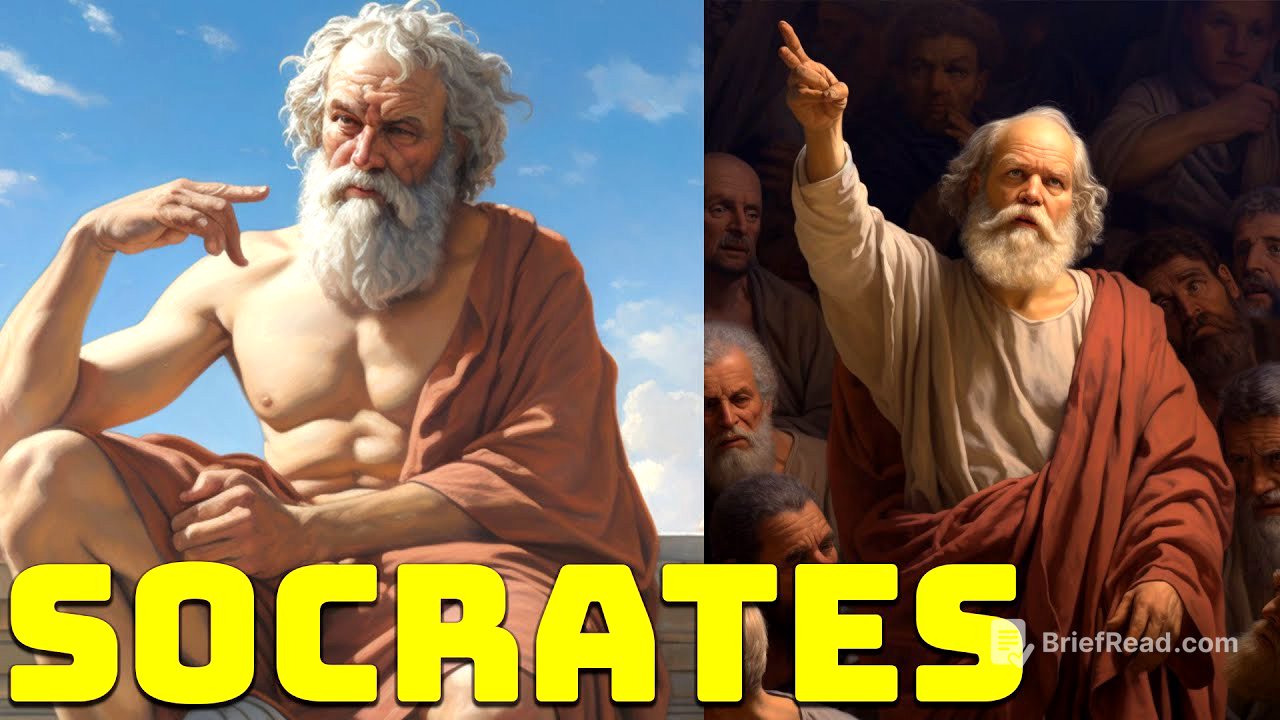TLDR;
Socrates, a renowned figure in history, left a significant philosophical legacy despite not founding a school or writing himself. His life and philosophy are primarily known through the works of Plato, Aristophanes, and Xenophon, who portrayed him in diverse ways. Socrates' philosophy emphasized self-reflection, dialectics, and the pursuit of truth, leading to his famous assertion, "I know that I know nothing." Accused of corrupting youth and disrespecting the gods, he was sentenced to death, facing it with remarkable composure. His teachings encourage critical thinking, humility, and a constant quest for knowledge.
- Socrates' life and philosophy are known through Plato, Aristophanes, and Xenophon.
- He used the Socratic method and dialectics to challenge assumptions and foster self-reflection.
- Socrates was accused of corrupting youth and sentenced to death, which he faced with courage.
- His legacy emphasizes critical thinking, humility, and the pursuit of knowledge.
Introduction to Socrates [0:00]
Socrates is a renowned and influential figure in history, celebrated for his profound philosophical legacy. Despite his fame, Socrates did not establish a school or produce written works. Our understanding of his life and philosophy comes from the accounts of other authors, primarily Plato, Aristophanes, and Xenophon. These authors offer diverse perspectives on Socrates, with Plato and Xenophon being great admirers, while Aristophanes presents a less favorable view in his comedy "The Clouds," where Socrates is ridiculed as a false sage and a corruptor of youth.
Sources on Socrates' Life [0:46]
Plato (428-348 BC) and Xenophon (430-355 BC) admired Socrates, while Aristophanes critiqued him in his comedy "The Clouds" (423 BC), portraying him as a corruptor of youth and disrespectful to the gods. Despite the negative portrayal, Aristophanes' writings, like those of Xenophon and Plato, mention Socrates' use of dialectics and the Socratic method. Aristophanes describes Socrates as a simple, poor man who walked barefoot and lived modestly, traits also noted by Xenophon in "Memorable Thoughts of Socrates," highlighting his lack of slaves, simple diet, coarse clothing, and absence of shoes. Other authors like Diogenes Laertius, Cicero, and Aristotle also contributed to understanding Socrates' life and philosophy.
Socrates' Early Life and Personal Traits [2:40]
Socrates was born in Athens in 469 BC to sculptor Sophroniscus and midwife Phaenarete. While not considered physically beautiful, he married Xanthippe and had a son, Lamprocles; some accounts suggest he had additional children with another wife. Socrates lived a modest life, indifferent to luxury, which became his trademark. He sometimes exhibited unusual behavior, such as prolonged meditation, oblivious to his surroundings. Plato's "Symposium" recounts Socrates' resilience to cold, walking barefoot on ice, and his ability to consume large amounts of alcohol without becoming drunk. He served in the military during his youth, participating in the Peloponnesian War between Athens and Sparta (431-404 BC), where he was recognized for his heroism.
The Famous Quote: "I Know That I Know Nothing" [5:23]
Socrates' famous quote, "I know that I know nothing," originated from an event where his friend Chaerephon consulted the Oracle of Delphi. The oracle declared Socrates the wisest man, puzzling him because he believed he knew nothing. Socrates sought to understand the oracle's meaning by questioning politicians, poets, and craftsmen considered wise. He concluded that these individuals were not truly wise because they were unaware of their own ignorance. Socrates realized he was wiser because he recognized his lack of knowledge, unlike those who believed they knew something.
The Socratic Method and Dialectics [7:20]
Socrates became well-known in Athens for his Socratic method, which involved questioning individuals in public places on seemingly simple subjects. By deconstructing their answers with further questions, he exposed inconsistencies and revealed their lack of true understanding. This self-reflection allowed people to gain new perspectives on the discussed issues. Socrates used dialectics, the art of discourse, to critically examine accepted concepts, often leading people to recognize their ignorance. He likened his method to midwifery, helping to bring forth innovative ideas already present within people. This process, aimed at revealing contradictions and misunderstandings, was called maieutics. Unlike the sophists, Socrates never charged for his teachings.
Virtue, Accusation, and Death [9:18]
Socrates believed that knowledge equated to virtue, asserting that those with knowledge are incapable of evil, which stems from ignorance. He saw a direct relationship between morality and knowledge, suggesting that knowing good inherently prevents one from doing evil. At 70, Socrates was accused and condemned in Athens. Plato's "Apology" recounts the allegations made by Anytus, Meletus, and Lycon, accusing Socrates of corrupting the youth and not believing in the city's gods, but introducing new deities. Xenophon also described Socrates' trial and death, emphasizing his sense of being wronged. Both Xenophon and Plato noted Socrates' peace before his death. During the trial, Socrates mentioned his divine mission, guided by an inner voice or "daemon," which provided suggestions on what to do. Socrates was sentenced to death and forced to ingest hemlock. Plato's "Phaedo" highlights Socrates' composure and courage in the face of death, describing him as the best, wisest, and most just of men.
Socrates' Legacy [11:13]
Socrates is considered one of history's greatest philosophers, influencing subsequent thinkers with his significant philosophical legacy. His teachings encourage analyzing thoughts and adopting a critical perspective on reality. Studying Socrates emphasizes the importance of maintaining a critical stance and practicing humility in the pursuit of knowledge.






![[Digimon Podcast] LiT Episode 68 - The Ugly Stick Goes DigiMental](https://wm-img.halpindev.com/p-briefread_c-10_b-10/urlb/aHR0cDovL2ltZy55b3V0dWJlLmNvbS92aS9hRDlVc0hOX29SYy9ocWRlZmF1bHQuanBn.jpg)


